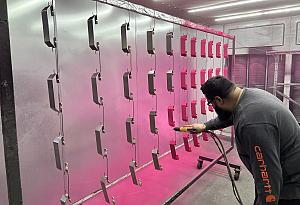- FMA
- The Fabricator
- FABTECH
- Canadian Metalworking
Categories
- Additive Manufacturing
- Aluminum Welding
- Arc Welding
- Assembly and Joining
- Automation and Robotics
- Bending and Forming
- Consumables
- Cutting and Weld Prep
- Electric Vehicles
- En Español
- Finishing
- Hydroforming
- Laser Cutting
- Laser Welding
- Machining
- Manufacturing Software
- Materials Handling
- Metals/Materials
- Oxyfuel Cutting
- Plasma Cutting
- Power Tools
- Punching and Other Holemaking
- Roll Forming
- Safety
- Sawing
- Shearing
- Shop Management
- Testing and Measuring
- Tube and Pipe Fabrication
- Tube and Pipe Production
- Waterjet Cutting
Industry Directory
Webcasts
Podcasts
FAB 40
Advertise
Subscribe
Account Login
Search
Fixing the economy—it's not that simple
- By Vicki Bell
- March 26, 2014
I had lunch the other day with a banker who spends a good deal of time, as most bankers do, handling other people’s money—in his case, his clients’ investments. I asked him what he thought about the economy—is it improving? His response was that we (in the U.S.) appear to be on a precipice, and people are waiting to see if we inch forward or fall back. We’re afraid to make a move for fear that it will be against the tide.
According to CNBC’s All-American Economic Survey, the tide appears to be going nowhere, and we’re not happy.
As reported in the article Americans Bummed About the Economy, the CNBC survey found that “despite two quarters of strong growth ending 2013, American’s views on the economy remain depressed with only the slightest improvement compared to a year ago.
“More than 80 percent view the economy as just fair or poor, almost unchanged from the fourth-quarter survey. While that represents an improvement from the depth of the financial crisis in 2008, when 95 percent of Americans were downbeat on the economy, it’s still a long way from the precrisis level of 72 percent.
“Just 17 percent of Americans view the economy as good or excellent. In 2007, before the Great Recession, it was 26 percent.”
Regarding their personal economies, Americans have “relatively muted expectations for increases in wages and housing prices,” seeing their wages rising 2.2 percent in the next year, down from 3.3 percent in the previous survey.
In other findings, wealth-gap perceptions are rising, and Americans by 2 to 1 favor increasing the minimum wage to $10.10. “By 47-40 percent, American’s believe it is more significant that raising the minimum wage will potentially reduce poverty than it will potentially cost jobs.”
Most of us would like to see people make more money, ourselves included. Popular logic tells us that the more money people make, the more they spend, and the more they spend, the better off the economy. But according to some economists, including Peter Morici, it’s not that simple.
In his article on the statesmanjournal.com, Stagnant wages not holding back U.S. economic growth, Morici said, “Progressive politicians and labor leaders use this line to argue raising the minimum wage would push the economy into high gear. If that were so, then increasing the federal minimum to $10.10 an hour, as President Obama happily campaigns, would not kill 500,000 jobs as the nonpartisan Congressional Budget Office predicts.
“What the president and the unions fail to mention is that businesses can’t print money to cover higher wages. They must charge higher prices, slash profit margins, and reduce dividend payments to stockholders.
“The latter are often middle-class workers with IRAs, and the elderly, who will spend just about every dollar they get as they draw down from those nest eggs. Those folks spend too, and, in fact, many of them buy more domestic products and fewer imports at Walmart, because older folks spend more on health care and other services, which are made in America, not China.
“Much the same applies to wealthy Americans—they are more likely to spend their dividends at home.”
Morici also said, “Americans really are spending again, but not enough of those dollars stay at home to create jobs.”
Who’s right and who’s wrong? And if raising the minimum wage is not the solution, then what is?
Morici blames policy for the lame economy. “Fixing petroleum policy and encouraging Americans to engage in just a little more conservation would eliminate the 5 million barrels a day of oil the United States still imports. If America did that, and confronted China and other currency cheaters over protectionism, the economy could cut the ranks of the jobless in half and drive the unemployment rate to 4 percent.”
As politicians try to figure out who’s right and who’s wrong and what to do, my banker friend is focused on protecting those IRAs and his elderly and middle-class investors. Nothing is gained if they too fall into the poverty ranks.
Follow fabcomlady on Twitter.
Become a fan of The Fabricator® on Facebook.
subscribe now

The Fabricator is North America's leading magazine for the metal forming and fabricating industry. The magazine delivers the news, technical articles, and case histories that enable fabricators to do their jobs more efficiently. The Fabricator has served the industry since 1970.
start your free subscriptionAbout the Author

Vicki Bell
2135 Point Blvd
Elgin, IL 60123
815-227-8209
- Stay connected from anywhere

Easily access valuable industry resources now with full access to the digital edition of The Fabricator.

Easily access valuable industry resources now with full access to the digital edition of The Welder.

Easily access valuable industry resources now with full access to the digital edition of The Tube and Pipe Journal.
- Podcasting
- Podcast:
- The Fabricator Podcast
- Published:
- 04/09/2024
- Running Time:
- 63:55
In this podcast episode, Brian Steel, CEO of Cadrex Manufacturing, discusses the challenges of acquiring, merging, and integrating...
- Industry Events
16th Annual Safety Conference
- April 30 - May 1, 2024
- Elgin,
Pipe and Tube Conference
- May 21 - 22, 2024
- Omaha, NE
World-Class Roll Forming Workshop
- June 5 - 6, 2024
- Louisville, KY
Advanced Laser Application Workshop
- June 25 - 27, 2024
- Novi, MI































